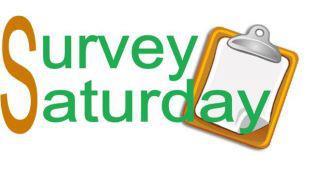Ag Entrepreneurship: What made you decide to gather feedback from your Facebook followers?
Julie Flinchbaugh: All throughout the year, people suggest ideas or share comments with us. But, I wanted to find out just how many thought the same thing. So I comprised a list of feedback I felt I had received in the past, and composed questions based on those! My goal is to not only entice new customers, but make our Market the best shopping experience while they're here, and if satisfying one more of their needs is the way to do it - then that is what I will do!
 AE: How did you decide upon "Survey Saturday?"
AE: How did you decide upon "Survey Saturday?"JF: "Survey Saturday" was just one of those ideas that randomly popped into my head on a Saturday, that I though about posting a random question, and the whole plan seemed to work! I didn't want to make it an excessive questioning period, and it seemed that Saturday might be the day, giving individuals something to look forward to throughout the week. I wanted them to have to check back each week to keep them involved.
AE:What was your goal with the surveys?
JF: It was kind of three fold. First, I wanted to see how many people out of our total following would respond (we had 93 out of I believe 850-ish followers responds at some point) - to determine if our Facebook marketing was working. Second, I wanted answers to the questions I posed! Third, I wanted to be sure I created a bit of buzz during the winter months gearing up for our season opening!
AE: Were the responses what you expected?
JF: I really did not know what to expect, but I was so very shocked by the participation. I found that most questions that revolved around them selecting an 'a, b, c, d, or e' answer garnered the most feedback. It seemed the open-ended questions were "too tough" or something for them. Some of the specific answers they provided shocked me some...I was really surprised how many people just wanted "fair" prices vs. having to use coupons or loyalty cards.
 | ||
| Post showing a change made as a result of Survey Saturday. Notice the number of likes, comments & shares. |
JF: Well, we have found a local supplier for all-natural freezer beef, a larger selection of veggies, have implemented a "Little Sprouts" summer class for children, and are considering offering surprise discounts for Facebook followers for specific days or weeks. Our e-newsletters have been redesigned to offer more "how-to" information and are spotlighting on more of our local items.
AE:What impact has doing the surveys had on the business?
JF: I feel as if I/we know more of what our customers are thinking each day they pop into the Market. In understanding what they are "thinking" I don't doubt my decisions nearly as much - which is refreshing. I feel as if I am not taking a gamble half as much when I select new products or develop new ideas. I believe it has also opened up a channel for even better conversation with our customers too...they are more willing to share ideas or concerns with us!
If you have a Facebook or Twitter presence for your ag business, consider leveraging it to do some market research. With just a little effort you can gather valuable information and feedback to help with the business decisions you may be faced with.




